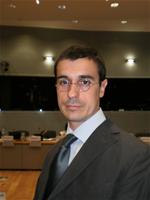What does Brussels say when it says nothing
Ralitsa Kovacheva, July 6, 2010
 European Commission's report on Bulgaria within the framework of the Control and Verification Mechanism in the area of justice and home affairs would not be published by the Commission on Jule 22 because it was still not written - this is how the Commission's spokesperson Mark Gray rushed to calm the impatient Bulgarian journalists with whom he met in Brussels. "Bulgarian media are just obsessed by two questions - when the report will be published and whether it is good or bad (and are we better than Romania)", Gray joked (or not quite).
European Commission's report on Bulgaria within the framework of the Control and Verification Mechanism in the area of justice and home affairs would not be published by the Commission on Jule 22 because it was still not written - this is how the Commission's spokesperson Mark Gray rushed to calm the impatient Bulgarian journalists with whom he met in Brussels. "Bulgarian media are just obsessed by two questions - when the report will be published and whether it is good or bad (and are we better than Romania)", Gray joked (or not quite).
Although he refused to comment in details on "a piece of paper which is still not available", the spokesperson roughly outlined the main directions of the CVM report. The first change is the desire for cooperation of the Bulgarian authorities which, Gray reminded, was not always true. It appears that Brussels is very much aware of the feeling, which is especially strong in Sofia, that there is some kind of routine and exhaustion from the mechanism and the reports seem not to be accepted with an interest and enthusiasm as before. As you know euinside and blogeurope organised a discussion precisely on this issue. The participants expressed the opinion that the Commission should increase the pressure on government for reforms, relying very much on the strong civil support in the country. In this sense was my question to Mark Gray who denied such a thesis:
"The pressure of the European Commission has not changed. It has not diminished - for example because of the government - it is the same as two years ago. The Commission is as much interested this mechanism to be over as the Bulgarian and Romanian authorities. But we have pressure from the Member States, from the Commission itself to ensure that the commitments are met. In these four years the levels of progress or its lack constantly changed, just like a yo-yo. But for us the key element is not to seek progress two weeks before the report and then everyone to go to the beach and say it is over. No one in the Commission will put an end to the mechanism just because this might be convenient. It will last as long as it delivers results".
Gray however, shared that he was impressed by the strong civil pressure for continuation of reforms: "What impressed me in Bulgaria was how much public pressure and support there is for this process of reforms to happen and the commitments of enlargement to be kept".
euinside noticed an important change of the basic accents of the report, outlined by Mark Gray. "The problems in the judiciary will not be solved by several big, important cases, they need to be solved in the local courts, in the small towns, away from Sofia" - a thesis, expressed several times during our discussion because this would mean a really working judiciary. The spokesperson also put a focus on the issue of judiciary in all levels of the system:
"What we usually see is that a legislation is being proposed, that it is being approved but what we don't see is its rightful application. And this goes both for the prosecution and the court. For years we see how hard it is to collect evidence, how hard it is to reach a conviction and in most cases it is the smallest possible and even then we have no arrests", Gray added. And gave the example of other European countries where a defendant has no opportunity to protract a trial with years while he is free because "appealing is not being conducted from the beach but from the prison cell".
Of course, the conflict of interest continues to be an issue in the report as well as many other remarks which obviously we will read again. And this will happen twice a year, each year until the remarks are being removed. However, there is another new moment in the report - the problem with the Bulgarian statistical data. As you know the Commission clearly expressed its surprise regarding the revised budgetary deficit of Bulgaria and the update of the budget, especially because it did not have any information about the reasons.
The statistics issue will not be a focus in the report but it will be mentioned, said, responding to a question of euinside, the spokesperson of the Economic and Monetary Affairs Commissioner Olli Rehn - Amadeu Altafaj. Mark Gray himself refused to comment in details but in the context of the pressure Bulgarian society is expecting from the Commission, reminded that in 2008 the Commission froze European funds worth 500 mn euros for Bulgaria. This was pressure and it delivered, the spokesperson added.
responding to a question of euinside, the spokesperson of the Economic and Monetary Affairs Commissioner Olli Rehn - Amadeu Altafaj. Mark Gray himself refused to comment in details but in the context of the pressure Bulgarian society is expecting from the Commission, reminded that in 2008 the Commission froze European funds worth 500 mn euros for Bulgaria. This was pressure and it delivered, the spokesperson added.
It is curious how exactly the issue of Bulgarian statistical data will be formulated in the report, especially in the context of the Commission's ambition to increase the economic and budgetary control over government and to sanction violators precisely with funds freezing. Furthermore, Brussels' final assessment will be ready after the Eurostat's mission in Sofia in September when the CVM report will have been published by then.
It is also interesting that no one is now talking about another, extraordinary mission of the European Commission in Sofia, maybe because, as a source of euinside explained, the entire necessary information, required from the Bulgarian authorities, had already been provided. As euinside forecast back then, obviously the surprising statement of Commissioner Rehn about the doubts in Bulgaria, has done its part as a last attempt for pressure on Bulgaria to provide the necessary information.
But obviously when we talk about pressure, the Commission relies very much on Bulgarian civil society. Because it should require and, in the end of the day, benefit from the results. The mechanism is delivering results and will continue until the work is done but this depends on you, Mark Gray said:
"The Commission is very patient but this is a marathon and not a sprint. Bulgaria is the one to decide when it will cross the finish line, not the Commission. For the Commission it is over when all benchmarks are fulfilled".
The most intriguing comment of Mark Gray about the report, combined with his specific smile was: "The most interesting thing in the report very often is what had not been said".